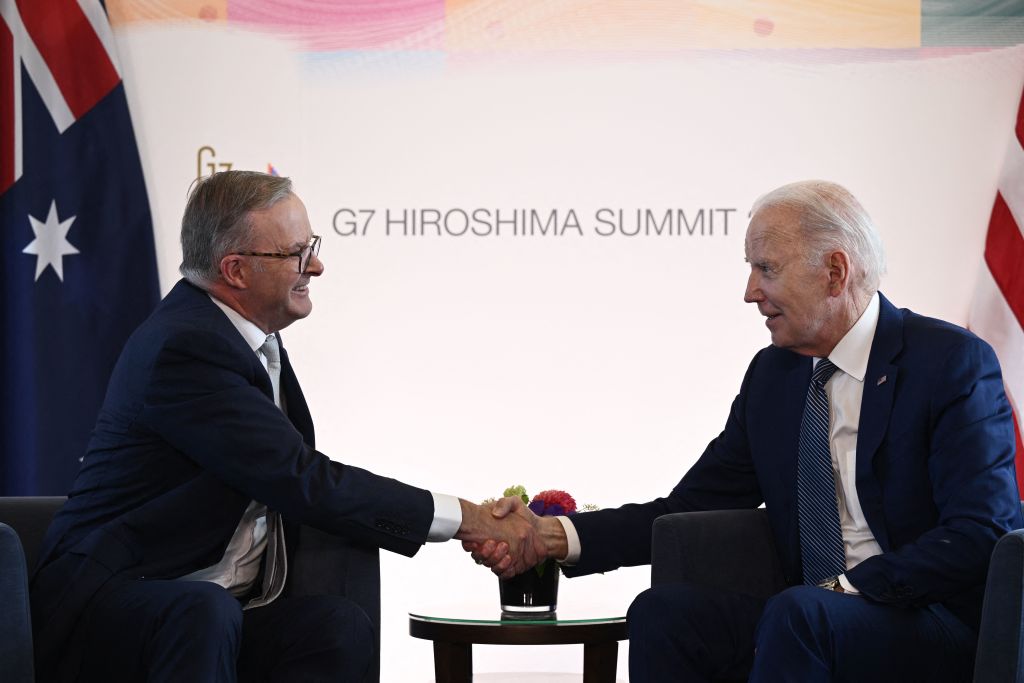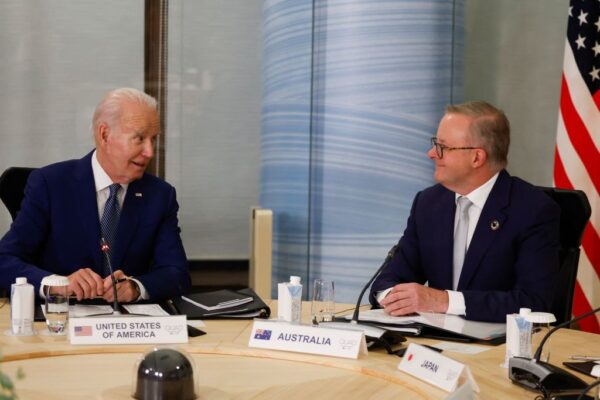


The United States will support Australia to become a global renewable energy powerhouse and has established renewable energy and the climate as a “central pillar” of the bilateral alliance.
“Today, what we’ve done is add a new element to that alliance up front, very clearly, unequivocally, on climate action. Because climate action, of course, is a national security issue,” Australian Prime Minister Anthony Albanese said.
While the details remain unclear, this could allow Australia access to funding from U.S. President Joe Biden’s Inflation Reduction Act.
Albanese met Biden in Hiroshima, Japan, on the sidelines of the G7 summit.
The president said this was a testament to their close bilateral cooperation.
“We’re going to establish climate and clean energy as the third pillar of the Australia-U.S. Alliance. This contract can enable the expansion and diversification of clean energy supply chains, especially as it relates to critical materials,” he said.
The two leaders declared they were taking “urgent action” to elevate global climate ambition, accelerate the global energy transition, and support climate efforts in the Indo-Pacific region.
“Our ambitious agenda calls for an unprecedented expansion in renewable energy generation, clean energy technologies manufacturing, and critical minerals supply year-on-year,” they said in a joint statement.
A task force for critical minerals will be established to promote a sustainable and stable supply of the resources, which are important to both clean energy and defence supply chains.
Australia and the United States will also drive the development of emerging battery technologies and support the development of emerging markets in the Indo-Pacific for clean hydrogen.
The countries will also support Pacific island countries, which have been vocal in their concerns about climate change.
“Recognising the disproportionate impacts of climate change on Pacific island countries, Australia and the United States commit to supporting Pacific-led initiatives to enhance climate change mitigation, adaptation, and resilience efforts, working closely with regional partners to help ensure these efforts respond to the needs of the Pacific Island people,” both leaders said.
Albanese said action on climate change was the “entry fee to credibility” with Australia’s neighbours.
“Many of our neighbours understand that climate change is an existential threat,” he said.
He added that critical minerals are an important component of Australia’s national security.
“And that’s why it is an important component, an essential part of our alliance.”
Biden and Albanese also announced a number of other initiatives, including increasing collaboration in space and quantum technology.
Biden also plans to ask the U.S. Congress to add Australia as a domestic source in Title III of the Defense Production Act. If successful, this will help accelerate the implementation of AUKUS and facilitate the investment and buying of Australian critical minerals and technologies.
The announcement comes as Albanese pledged to remain a reliable supplier of energy to Japan amid the transition to net-zero.
In February, Japan warned Australia that its relationship could be jeopardised because the New South Wales (NSW) coal reservation scheme risked cutting coal exports.
According to The Australian, Japanese Consul-General Tokuda Shuichi had written a letter to the NSW government to express the concerns of Japanese companies about the coal reservation measure introduced in mid-January.
While the Japanese consulate did not elaborate on the letter’s content, it was understood that Japan worried about the impact of the NSW government’s decision on the coal supply to the country.
Any interruption to the supply will likely affect the Japanese economy, which has suffered from the global energy crisis following the war in Ukraine and undermines Australia’s reputation as a coal exporter.
This is not the first time Japan has warned about Australia’s energy sector.
In July 2022, Japanese Ambassador Yamagami Shingo criticised the massive coal royalty tax introduced by the Queensland government, saying it could push away Japanese investors and undermine the decades-long partnership between both countries.
Alfred Bui contributed to this report.

